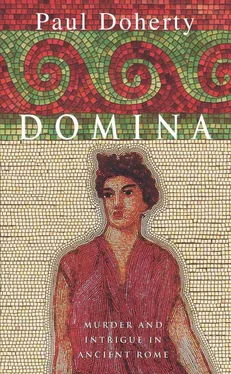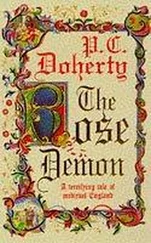Paul Doherty - Domina
Здесь есть возможность читать онлайн «Paul Doherty - Domina» весь текст электронной книги совершенно бесплатно (целиком полную версию без сокращений). В некоторых случаях можно слушать аудио, скачать через торрент в формате fb2 и присутствует краткое содержание. Год выпуска: 2012, ISBN: 2012, Издательство: Headline, Жанр: Исторический детектив, на английском языке. Описание произведения, (предисловие) а так же отзывы посетителей доступны на портале библиотеки ЛибКат.
- Название:Domina
- Автор:
- Издательство:Headline
- Жанр:
- Год:2012
- ISBN:9780755350490
- Рейтинг книги:3 / 5. Голосов: 1
-
Избранное:Добавить в избранное
- Отзывы:
-
Ваша оценка:
- 60
- 1
- 2
- 3
- 4
- 5
Domina: краткое содержание, описание и аннотация
Предлагаем к чтению аннотацию, описание, краткое содержание или предисловие (зависит от того, что написал сам автор книги «Domina»). Если вы не нашли необходимую информацию о книге — напишите в комментариях, мы постараемся отыскать её.
Domina — читать онлайн бесплатно полную книгу (весь текст) целиком
Ниже представлен текст книги, разбитый по страницам. Система сохранения места последней прочитанной страницы, позволяет с удобством читать онлайн бесплатно книгу «Domina», без необходимости каждый раз заново искать на чём Вы остановились. Поставьте закладку, и сможете в любой момент перейти на страницу, на которой закончили чтение.
Интервал:
Закладка:
‘But that wasn’t enough?’ I insisted.
‘I had to make sure,’ she replied. ‘Yes, after I sent a guard to decapitate her, I wanted to make sure she was dead, so they brought her head back to Rome in a bucket of brine. I kept the head as a memorial before giving it over for burial. Were you shocked, Parmenon? Of course you were,’ she mocked. ‘Once she was gone!’
‘You made some mistakes.’
‘Oh, yes I did. You’re thinking of Seneca, our Spanish Socrates? What does Petronius say about him? “As big a humbug as he is a philosopher”!’
‘Why did you bring him back from exile?’ I asked.
‘I wanted my son to have the best: a true classical education. He did deserve that, didn’t he, Parmenon?’
Oh yes, Nero deserved the best! The person to have benefited most from the fall of Messalina was Nero. Agrippina had seized power, but not to glory in it. She had only one purpose: to ensure the accession of her son. Nero was adopted as Claudius’s heir. He was declared the ‘Prince of Youth’ and shown every honour, both in public and private. He was given his own household, and Seneca became his tutor. Everywhere he went Nero was hailed as if he was Caesar already, a god-designate. His only rival was Messalina’s son but Britannicus was weak and sickly, and Agrippina soon dealt with him. One by one his friends and protectors were removed and replaced with Agrippina’s spies, and he was edged out onto the limits of court life. I only met the boy on a few occasions; he was smiling-eyed but weak-faced, and I always felt sorry for him. Nero, on the other hand, chilled me. He loved the adulation and delighted in the role his mother had created for him.
To strengthen her son’s position even more, Agrippina decided Nero should marry Claudius’s young daughter Octavia, although she was already betrothed to a nobleman, Lucius Silanus. Agrippina began a campaign against him, accusing him, of all things, of incest with his sister. Lucius cut his throat and Nero and Octavia were betrothed; the fact that they were second cousins proved little obstacle.
Just after his fourteenth birthday, Nero received the ‘Toga Virilis’, the mark of manhood, as Agrippina was in a hurry for her son to grow up. She asked me to attend on him, which I did reluctantly as I would have preferred to keep well away from him. Whenever I was in his presence I was always reminded of Caligula, though Nero looked nothing like his hollow-eyed uncle. By that time Nero’s hair had a strong tinge of auburn, almost copper-red, and was dressed in thick masses of curls around his forehead and the nape of his neck. He had blunt, heavy features and protruding eyes. His near-sighted pale-blue eyes and heavy eyelids gave him a dreamy, innocent look, which he used as a mask to portray himself as the noble young prince, the studious scholar, the Caesar in waiting. Now and again this mask would drop, as it did on the day of his toga ceremony.
Before leaving the palace, Nero consecrated the gown of his boyhood to the House of Gods, and placed at their feet the golden chain every boy wears as a charm during their childhood. Afterwards he was escorted solemnly to the temple of Jupiter amidst the waiting, clamouring crowds. Nero loved every minute of it. He stopped at the crossroads where the priestesses of Bacchus, their heads crowned with ivy, gave him small fried cakes dipped in honey, a symbol of his new manhood. From the temple Nero was escorted to the amphitheatre, where free corn had been distributed to the mob and silver to the troops. Nero, wearing triumphal dress, was hailed and adored, and sat beaming at his worshippers, licking his lips as his eyes leered at the women. He touched my wrist and leaned over.
‘Do you know, Parmenon,’ he laughed. ‘Seneca says I must be offered all temptations so that I can be trained to master my passions!’
His remark created ripples of laughter around us. Nero’s eyes held mine, and his smile faded; even then he was plotting how he could escape Agrippina’s influence. I reported this to my mistress but she refused to believe it.
‘He’s only testing the water,’ she replied.
‘Was it wise to hire Seneca?’ I asked. ‘Remember what the old humbug said; “If you preach austerity to a young man, eventually it makes him want to savour the opposite”.’
‘Seneca is doing a good job,’ Agrippina replied absent-mindedly. ‘My son is being schooled well, so when the Emperor dies, may the Gods forbid, Nero will be Caesar.’
Of course, in power everything has its own reaction. For four years Agrippina was given the run of Rome, removing opposition, managing the Senate, bribing the guards, keeping the freedmen in her camp. Opponents such as Lollia Paulina were given short shrift but Agrippina had no blood lust, preferring instead to influence people, to ease the way, to open doors through guile. Through Pallas she could organise the Senate and eventually the Praetorian Guard. Whoever controlled that crack regiment had a strong power base: they would be the ones to hail the new Emperor and take care of any opposition. Agrippina had already distributed largesse and, of course, as the daughter of the great Germanicus, the troops held her in high regard. Agrippina made sure that such adoration remained constant and eventually persuaded Claudius to appoint her nominee, the thickset, capable and loyal Sextus Burrus, as Commander of the Praetorian Guard. He was an administrator rather than a campaigner but a man Agrippina thought she could fully control.
Only one obstacle remained: the freedman Narcissus. Although he had joined Agrippina in bringing down Messalina, he had soon realised he’d merely replaced one Empress with an even more powerful one. Narcissus withdrew from Agrippina’s circle, studying her tactics carefully. He did not oppose Agrippina or Nero openly but instead, reminded Claudius constantly of the ‘sweet days’ he had enjoyed with Messalina, and emphasised the rights and duties of poor Britannicus. Claudius had quickly tired of each of his wives and Agrippina was no exception. Once Narcissus realised he was sowing on fertile ground, his campaign gained pace. Britannicus was invited back to court, fawned on and favoured, and Agrippina knew that she would have to strike quickly.
Chapter 13
‘It is part of human nature to hate those whom you have injured’
Tacitus, Agricola: 42‘What am I to do with Claudius?’
In the spring of the fourteenth year of Claudius’s reign, Agrippina was openly showing her discontent. She was thirty-nine years of age but looked much younger, despite the occasional white hair or faint lines on her olive-skinned face. Power and influence can create eternal youth, or at least the illusion of it. During those years of power, Agrippina had very rarely consulted me: Nero was the beginning and end of her life, and Agrippina suspected I did not share the same, unquestioning adoration of her son. She would hear nothing even slightly derogative about the young man that I secretly called ‘The Monster’. Nero was a superlative actor in front of those who mattered, but allowed his mask to slip with me. He would sidle up to me and make the occasional salacious remark about a senator’s wife or tell me in vivid detail what he would like to do to some person who had inadvertently offended him. He was an apt pupil of Seneca; the old, yellowing-skinned hypocrite had a tongue coated in acid and all the compassion of a striking viper.
‘What am I going to do about Claudius?’ Agrippina repeated.
We were seated in one of the gardens outside the palace, a sinister place that had once been used as a paupers’ burial ground. The outlines of the death-pits were still visible. During the time of Augustus its use as a cemetery was abandoned and it had been lawned over. Seventy years of lying fallow had benefited the rich soil, in which almost every bush and flower known to the empire bloomed. The heavy scent of flowers was almost overbearing but few birds flew or nested there. Many claimed it was a place of darkness, and the many palace sorcerors and soothsayers would often go grubbing amongst the abandoned graves for bones and herbs to make their magical potions.
Читать дальшеИнтервал:
Закладка:
Похожие книги на «Domina»
Представляем Вашему вниманию похожие книги на «Domina» списком для выбора. Мы отобрали схожую по названию и смыслу литературу в надежде предоставить читателям больше вариантов отыскать новые, интересные, ещё непрочитанные произведения.
Обсуждение, отзывы о книге «Domina» и просто собственные мнения читателей. Оставьте ваши комментарии, напишите, что Вы думаете о произведении, его смысле или главных героях. Укажите что конкретно понравилось, а что нет, и почему Вы так считаете.












